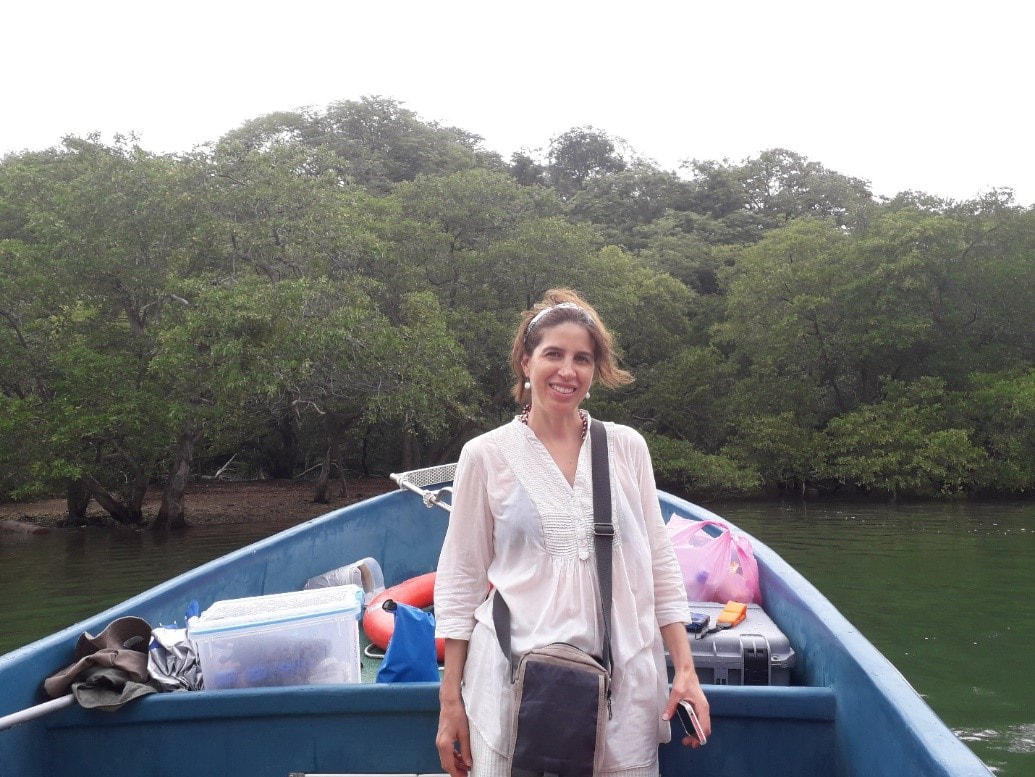I see ecohydrology as the study of the interactions between hydrological, biogeochemical and ecological processes, especially bringing more of the biotic component into hydrology and the consideration of plants as ecosystem engineers. I like the idea of merging different ways of thinking, like evolutionary perspectives from ecology with more mechanistic from hydrology. It also means a way to provide engineering solutions that are more sustainable in response to environmental problems or agricultural management.
What are your undergraduate and graduate degrees in?
My undergrad was in agricultural engineering at the Polytechnic University in Madrid (UPM). I did a Master in Agricultural Development at the University of California, Davis, where I specialized in remote sensing and a PhD in Environmental Remote Sensing. I was really lucky to be part of a blended program at the UPM and the Center for Spatial Technologies and Remote Sensing (CSTARS) at UC Davis with Susan Ustin.
How did you arrive at working in/thinking about ecohydrology?
I had an implicit interest on it before knowing the term since my PhD when I studied resilience of vegetation productivity to climate variability using remote sensing in California. I learnt about plant ecology, soil- plant-water relations expanding from a somewhat more reductionist view I had from my engineering background.
I only became familiar with ecohydrology as a discipline during my postdoc years, working on water-limited environments. In Spain, the group of Juan Puigdefábregas, at the Experimental Station of Arid lands (CSIC), was doing pioneer research on the role of vegetation patterns and vegetation interactions on hydrological processes. I started working with them in 2005 on a project on land degradation and groundwater. We wanted to quantify groundwater recharge in a region where a massive land use change of 26,000 ha. of plastic greenhouses, visible from space, was causing groundwater depletion and other environmental problems. Getting right the evapotranspiration of natural vegetation in the mountain range was key. This work sparked my interest on how plants influence the hydrological cycle via stomatal regulation and carbon allocation and how to model that in natural semiarid vegetation. Another part of my research in those years was on understanding how ecosystem functioning changed across land degradation/restoration trajectories to develop global remote sensing indicators of ecological status.
What do you see as an important emerging area of ecohydrology?
Using remote sensing data from satellites and drones can help to answer questions at multiple scales, assess the role of vegetation patterns on ecohydrological feedbacks, or help to integrate terrestrial and aquatic processes, like carbon flows, at the watershed level. A joint use of hyperspectral, thermal, LiDAR, photogrammetry or microwave data can retrieve plant function and structural traits, soil properties, soil moisture in terrestrial ecosystems or streamflows and water quality indicators like CDOM in freshwater ecosystems. From the remote sensing side, think that it is crucial to investigate mechanistic links between plant function and absorption, reflectance and emission radiation to move beyond machine learning/statistical methods or tuning effective model parameters with in situ data in process based models.
For me it is very exciting to see the current progress in understanding vegetation carbon, energy and water fluxes in relation to plant hydraulic traits, thermal regulation or the relations between functional, taxonomic and spectral diversity. However, I think most of the land surface models are lagging behind in incorporating some of those aspects, for instance still categorize ecosystems in terms of plant functional types. Considering these processes will help to improve predictions of tree mortality due to heat waves or assess community demography changes in relation to climate.
Do you have a favorite ecohydrology paper? Describe/explain.
It is difficult to say just one…Those that developed a theoretical basis of ecohydrology as a science in drylands like the book of Eagleson, P. (2002). Ecohydrology: Darwinian Expression of Vegetation Form and Function. Cambridge: Cambridge University Press. doi:10.1017/CBO9780511535680.
Recently, I have been inspired by the review from Mencuccini, M., Manzoni, S., & Christoffersen, B. (2019). Modelling water fluxes in plants: from tissues to biosphere. New Phytologist, 222(3), 1207–1222 about scalability of traits or the need to consider plant hydraulics to explain plant ecological strategies and dynamics.
What do you do for fun (apart from ecohydrology)?
During the dark Danish winter I enjoy watercolor painting. There is a part of letting things go, as the water flows without me being able to control it, turning into (sometimes) unexpectedly beautiful patterns. I also love walking in nature and traveling, sometimes combining work-holiday because as scientists we can go to beautiful places. In the picture, we were in Guanacaste, Costa Rica doing a spectral library for an algal bloom that was killing fish and turtles, on the side of our research.
I also have a hide-out, our cozy house in the Gredos mountains in Spain spending time with my husband, family and friends surrounded by vineyards, fig and olive trees, hearing the Arenal stream in the background while chatting around a good table...

 RSS Feed
RSS Feed